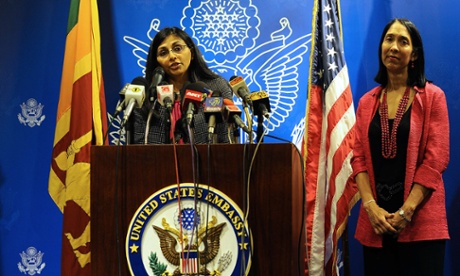By Brian Lanciault
Impunity Watch Reporter, Asia
COLOMBO, Sri Lanka– State Department officials announced Saturday that the United States will table a United Nations human rights resolution against Sri Lanka, putting new pressure on Colombo to address war crimes allegations.

The UN has already called on Sri Lanka to punish military personnel responsible for atrocities in the civil war that the government won in 2009. Washington says the human rights climate on the island is worsening each day.
Nisha Biswal, the assistant secretary of state for South and Central Asia, held talks with Foreign Minister G.L. Peiris over a range of issues including allegations that government troops killed thousands of Tamil civilians during the final months of the war in 2009.
“Lack of progress in Sri Lanka has led to a great deal of frustration and skepticism in my government and in the international community,” assistant secretary of state Nisha Biswal told reporters in Colombo after her two-day visit.
“There hasn’t been sufficient action taken by the government to address the issues of justice and accountability. We heard from many people about people who are still unaccounted for, whose whereabouts and fates are unknown to their family members.”
Biswal declined to say what would comprise the resolution set to be tabled at the March session of the UN Human Rights Council, but US embassy officials have said it may call for a full-scale international investigation into Sri Lanka and their military affairs.
“We understand growing concern, frustration, and skepticism among many in my country and many in the international community that has led to increasing calls for international investigation and an international process.” Biswal said.
President Mahinda Rajapaksa’s government, which finally put down an exhaustive 26-year rebellion by the Liberation Tigers of Tamil Eelam (LTTE) in 2009, has rejected UN calls for an international inquiry and said repeated requests from overseas were to please the large Tamil diaspora in the west.
A top Sri Lankan official announced last week that an international inquiry into war crimes would bring “chaos” and insisted that the government’s national reconciliation process must be given several more years to work.
Biswal acknowledged that the reconciliation process needed more time, but said credible steps had to be taken now.
“The culture of deterioration of human rights gives us great concern when churches and mosques are burnt down and people feel that they cannot practice their faiths freely and without fear. Then I believe the urgency that has gripped the international community is justified,” she said.
The British Prime Minister, David Cameron, has said he will push for the international inquiry into war crimes allegations if Sri Lanka does not conduct its own probe by March.
Some Sri Lankans who met with Biswal told reporters that they had told her an international process was essential.
“We do not have confidence in a local investigation because that would be done by the military, who are accused of war crimes,” one activist from northern Jaffna peninsula told Reuters, on condition of anonymity.
A UN panel indicated that about 40,000 mainly Tamil civilians died in the final few months of the war. Both sides committed atrocities, but army shelling killed most victims, it concluded. Separatist Tamil Tiger rebels renowned for the use of child soldiers and suicide bombings battled with government forces since 1983.
For more information, please see:
New York Times– U.S. Envoy to Visit Sri Lanka as Pressure Builds for War Crimes Inquiry— 30 January 2014
The Guardian– US to table UN human rights resolution criticizing Sri Lanka over ‘war crimes’— 1 February 2014
AFP– US envoy in Sri Lanka as pressure builds over war crimes— 31 January 2014
NDTV– US envoy to visit Sri Lanka as pressure grows for war crimes inquiry— 31 January 2014


